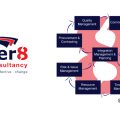High performing programme team – 8 critical success factors
There are many blogs, materials, literature, courses and advice that try to explain the methodology and approach of delivering a successful programme or project. They cover everything from clarifying objectives and tracking/controlling costs to fixing scope and managing it through change control, and more. Recently the importance of Business Change as a critical factor to success and its implication on people has also grown. Those are all fine but at the end of the day, all this good stuff is also done and delivered by people.
So behind best practice, the key to delivering a successful programme is building a high-performing programme team – have you met ours yet? Having done this numerous times in different organisations with people from all walks of life, here is a summary of the eight critical success factors in building a high-performing programme team:
1. The genetics and makeup of the team
Here at Acceler8 Consultancy, we believe the first thing with any team is its makeup. Having the right individuals with the capabilities, experience, attitude, aptitude, and diverse backgrounds is the foundation of a high performing team. This is vital to being quickly able to create the optimal environment for nurturing a team’s development and creating an agile delivery-focused culture.
2. A clear vision of outcomes and changes needed by the business
This is a common point with the usual best practice, but we take it a step further. The clear vision of outcome and changes must be understood by the programme team delivering the change so that every team member acts as a champion, irrespective of the roles they have.
3. Provide clear objectives and expectations to people
People work at their best when they know what they are responsible for. Making the objectives and expectations clear avoids misunderstandings. The aim of this is to stretch people and – if things get difficult – you need to be fair. This clarity means that people can comfortably focus to get the job done without the stress that comes from “what happens if”.
However, if a team member is not playing their part you must be firm, and not just for their benefit. This is not easy but if “free riders” aren’t challenged, the team’s high performers can become demotivated.
4. Encouraging openness and the raising of concerns, your “early warning system”
The usual pressure on people is to ensure and therefore show, that things are going well. This indirectly leads to a culture of keeping quiet about risks and emerging issues. By the time these come to light even the best response will not avoid at least some impact on the programme.
Instead, leaders can encourage people to raise concerns, even if they don’t have answers. This way everyone acts as your eyes and ears. That is the most effective early warning system to address risks and issues before they impact. The added benefit is that people who are listened to are more motivated. And when they realise their contribution just saved you thousands of pounds, they become more committed.
5. Treat everyone with respect, show trust and be flexible
Although people must have clear expectations, it is paramount to treat them with respect first. Trust is something that does develop with time, but if it’s not given at the start by you as the leader, there’s a high chance the team will not come together to be its best.
People will always face challenges, whether from work or personal circumstances. It’s during these times that a leader should be flexible. Most people will appreciate it so much that when project deliverables get tight, they’ll step forward to help their colleagues and by extension you as the leader.
6. Encouraging dialogue, collaboration and creating consensus
In project and programmes, there are always inevitable differences in opinion. At Acceler8 we don’t see these differences as a problem. Instead, these differences are often opportunities to refine things and improve quality. Improvement can be achieved by encouraging people to listen and work collaboratively to find a way to common ground.
Once your team works this way internally, they will adopt the same approach with stakeholders. In turn, stakeholder management can be spread across the team, driving consensus throughout an organisation.
7. Don’t task manage, give responsibility
An underlying factor in all this is to give people responsibility. Help them to plan and organise their own work. Micro-managing people’s tasks is a sure way of sapping productivity and motivation.
8. Recognition and celebrating successes
Finally, we all need a bit of encouragement. So successes should be highlighted and celebrated. Start with the small things at the early stages of the work to build up the recognition, no matter how small. And with time, as the team truly triumphs, the larger successes should be shared more widely.
In summary, putting people first in the way a programme operates, not just in words but in practical ways, will improve the success of even the most challenging programmes you may have.
Contact Acceler8 today and unlock the power of our ready-made high performing programme team!







